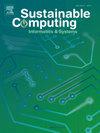Power management for smart grids integrating renewable energy sources using Greylag goose optimization and anti-interference dynamic integral neural network
IF 5.7
3区 计算机科学
Q1 COMPUTER SCIENCE, HARDWARE & ARCHITECTURE
引用次数: 0
Abstract
This paper proposes a hybrid power management strategy for smart grids (SGs) that integrates renewable energy sources (RESs), such as battery energy storage systems (BESS), fuel cells (FCs), wind turbines (WT), and solar photovoltaic (PV). The GGO-AIDINN approach integrates Greylag Goose Optimization (GGO) and an Anti-Interference Dynamic Integral Neural Network (AIDINN) to address high emissions during low renewable energy (RE) availability and rising operational costs from advanced infrastructure. The GGO optimizes resource allocation and energy distribution, maximizing the use of available RE. Meanwhile, AIDINN predicts energy consumption patterns based on weather conditions, improving overall system performance. The proposed GGO-AIDINN model is implemented on MATLAB and evaluated against several existing methods, including Fuzzy Logic Control (FLC), Non-dominated Sorting Genetic Algorithm (NSGA-II), and others. Results show the hybrid method achieves significant improvements, with an operational cost of $1328 per MW, emissions of 13.76 kg per MW, and an efficiency of 98.7 %. These outcomes demonstrate that GGO-AIDINN outperforms traditional techniques, offering lower costs, reduced emissions, and enhanced system efficiency. This makes it a superior solution for sustainable power management in SGs incorporating RESs and BESS.
基于灰雁优化和抗干扰动态积分神经网络的可再生能源集成智能电网电源管理
本文提出了一种集成可再生能源(RESs)的智能电网(SGs)混合电源管理策略,如电池储能系统(BESS)、燃料电池(fc)、风力涡轮机(WT)和太阳能光伏(PV)。GGO-AIDINN方法集成了灰雁优化(GGO)和抗干扰动态积分神经网络(AIDINN),以解决低可再生能源(RE)可用性和先进基础设施运营成本上升时的高排放问题。GGO优化资源分配和能源分配,最大限度地利用可用的可再生能源。同时,AIDINN根据天气状况预测能源消耗模式,提高整体系统性能。在MATLAB上实现了所提出的go - aidinn模型,并对几种现有方法进行了评估,包括模糊逻辑控制(FLC)、非支配排序遗传算法(NSGA-II)等。结果表明,混合方法取得了显著的改进,运行成本为1328美元/兆瓦,排放量为13.76 kg /兆瓦,效率为98.7 %。这些结果表明,go - aidinn技术优于传统技术,成本更低,排放更少,系统效率更高。这使得它成为SGs整合RESs和BESS的可持续电源管理的卓越解决方案。
本文章由计算机程序翻译,如有差异,请以英文原文为准。
求助全文
约1分钟内获得全文
求助全文
来源期刊

Sustainable Computing-Informatics & Systems
COMPUTER SCIENCE, HARDWARE & ARCHITECTUREC-COMPUTER SCIENCE, INFORMATION SYSTEMS
CiteScore
10.70
自引率
4.40%
发文量
142
期刊介绍:
Sustainable computing is a rapidly expanding research area spanning the fields of computer science and engineering, electrical engineering as well as other engineering disciplines. The aim of Sustainable Computing: Informatics and Systems (SUSCOM) is to publish the myriad research findings related to energy-aware and thermal-aware management of computing resource. Equally important is a spectrum of related research issues such as applications of computing that can have ecological and societal impacts. SUSCOM publishes original and timely research papers and survey articles in current areas of power, energy, temperature, and environment related research areas of current importance to readers. SUSCOM has an editorial board comprising prominent researchers from around the world and selects competitively evaluated peer-reviewed papers.
 求助内容:
求助内容: 应助结果提醒方式:
应助结果提醒方式:


